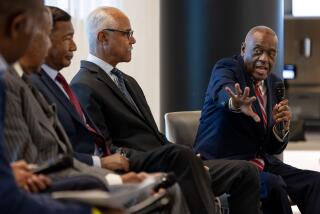Ones Remaining Enjoy a Mild Resurgence : Number of Pre-College Military Schools Wanes
- Share via
FORK UNION, Va. — If you become a cadet at Fork Union Military Academy and are caught chewing gum in class, be prepared to get up to three demerits and a 2-hour march with a 10-pound rifle.
Talk in chapel, have dirty fingernails or remain in bed after the 6 a.m. reveille, and be ready to receive as many as 10 demerits and pound the pavement for 7 1/2 hours.
And if you’re found with a bottle of booze or drugs, pack your duffel bag, soldier. Those offenses carry an automatic dismissal.
‘There’s No Privacy’
“I hate it,” snarled Cadet John Gould, 18, of Alexandria, Va., sipping a soda between classes at the Sabre Shop, the post exchange. “There’s no privacy. You are always being told what to do. You have to have short hair.
“But I’m glad I’m here,” Gould said. “At home, I partied hard, all the time. This place slowed me down. It got me to study. Next year, I’m going to college--the University of South Carolina. If I was home, I’d be going nowhere.”
Each day at Fork Union, cadets are required to shine their shoes, polish the floors of their rooms and make their beds. They must study at least 2 hours a night. Lights go out at 10 p.m. on weekdays and 11 p.m. on weekends.
Established in 1898 by a Baptist minister, Fork Union Military Academy is one of only about 40 pre-college military schools in the country, fewer than half the number a generation ago.
Return to the Basics
Many closed during the anti-military mood generated by the Vietnam War. In recent years, with a return to the basics and a new respect for the uniform, they have begun to enjoy a mild resurgence.
No new academies have opened, but most, like Fork Union, have had a rise in enrollment. And a few, unlike Fork Union, even went coeducational.
At Fork Union, 125 miles southwest of Washington in Virginia’s rolling countryside, regimented academics and no-nonsense discipline reign.
Each year, about 93% of the graduates go to college, including about half a dozen to the Army, Navy or Air Force academies. Another 30 cadets are expelled for an assortment of disciplinary reasons.
‘A Chance to Succeed’
“For the most part, we get kids who, for one reason or another, didn’t do well in their school at home,” said Col. Robert (Red) Pulliam, commandant of cadets. “Here they are given a structured environment, a chance to succeed.
“Kids don’t fall in love with it--getting up at 6 a.m., shining shoes, sitting down and studying two hours a night, but deep in their souls they know the value they are getting from it,” Pulliam said.
Last fall, Billy Cox, 15, decided he had had enough of the endless regulations and formal parades, pre-World War II-vintage barracks and boot polishing. He went AWOL.
With a couple of classmates, he made a 10-hour, 100-mile round trip to Richmond, Va. Upon their return, the boys got a stern lecture, 24 demerits and 18 hours of marching “punishment drills.”
‘A Big Mistake’
“When I got back, I realized I made a big mistake,” said Cox, of Reston, Va. “I won’t do it again. Everyone tells me if I leave this place it will be the end of Billy Cox. I believe them.”
Fork Union classes are organized into a lower school, grades five through eight, and an upper school, grades nine through 12. It also has a one-year, college preparatory course. The average stay for a cadet is 3.3 years.
The academy is military in name and structure only. There is no instruction in military sciences, such as tactics or weaponry. Even the rifles the cadets march with are “demilitarized,” meaning the firing pins have been removed.
Like the military, however, the cadets are divided into squads, platoons, companies and battalions. Each have young officers barking out the orders.
Leadership Is Earned
Col. Kenneth Whitescarver, a retired Marine and the academy’s president, explained the philosophy of the school.
“Kids here earn positions of leadership,” he said. “They learn how to get along with other kids, they learn how to influence others, they learn the rules of the game. And they learn self-discipline.”
Stephen Waldrop, 18, of Atlanta, Ga., has learned well. He is the top cadet in the upper school. Four years ago, he was the top cadet in the lower school. He hasn’t received a demerit since 1978, a year after he put on the gray uniform of Fork Union.
“What I like about the place is the friends you make, really good friends, and the strong academics,” Waldrop said. “What I don’t like is that things get monotonous after a while.”
Next year, Waldrop is going to Wofford College in South Carolina.
“I thought about going to a military academy (for college), but I decided I want to give civilian life a try,” he said.


